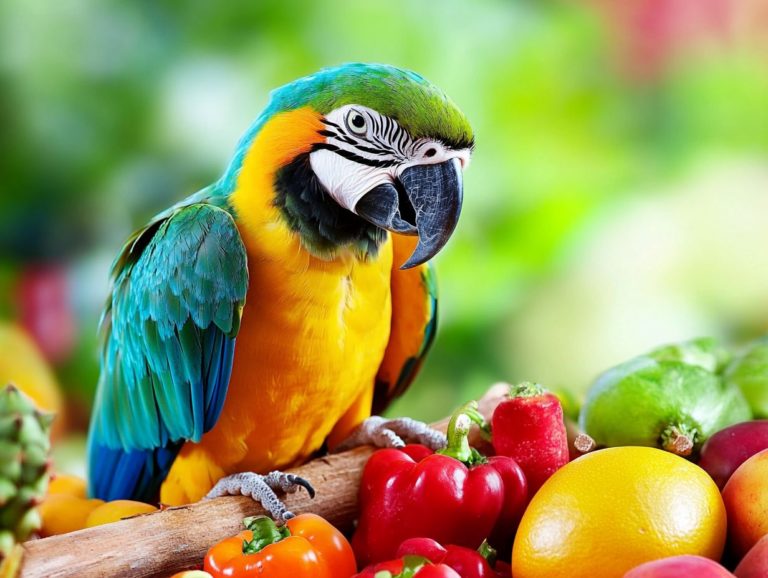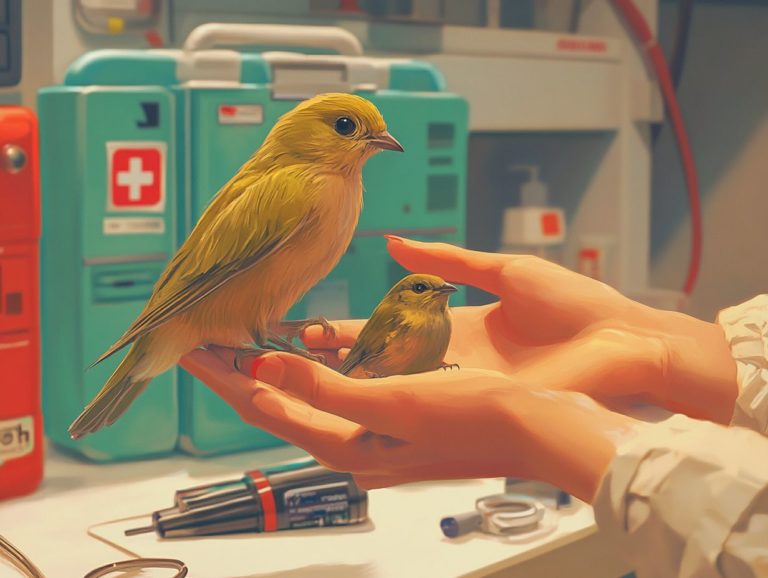How to Spot Allergies in Your Pet Bird
Allergies in pet birds, such as parrot allergies, can be a real puzzle for you as an owner. Often, they result in physical discomfort and behavioral shifts that might fly under your radar.
Grasping the causes of these allergies and recognizing their telltale signs is essential. Pinpointing common allergens like feather dust and pet dander helps keep your feathered friend healthy and content.
This article will equip you with the knowledge to identify symptoms, effectively diagnose and treat allergies, and implement preventive measures to create a safer environment for your avian companion.
Want your bird to thrive? Keep reading to learn how!
Contents
- Key Takeaways on Bird Allergies:
- Understanding Allergies in Pet Birds
- Signs and Symptoms of Allergies in Pet Birds
- Common Allergens for Pet Birds
- Diagnosing Allergies in Pet Birds
- Treating and Managing Allergies in Pet Birds
- Preventing Allergies in Pet Birds
- Frequently Asked Questions
- What are some common signs of allergies in pet birds?
- Can my pet bird develop allergies over time?
- What should I do if I suspect my pet bird has allergies?
- Are there any specific foods that can trigger allergies in pet birds?
- Can allergies in pet birds be treated?
- Is it possible for my pet bird to have allergies to their own feathers?
Key Takeaways on Bird Allergies:
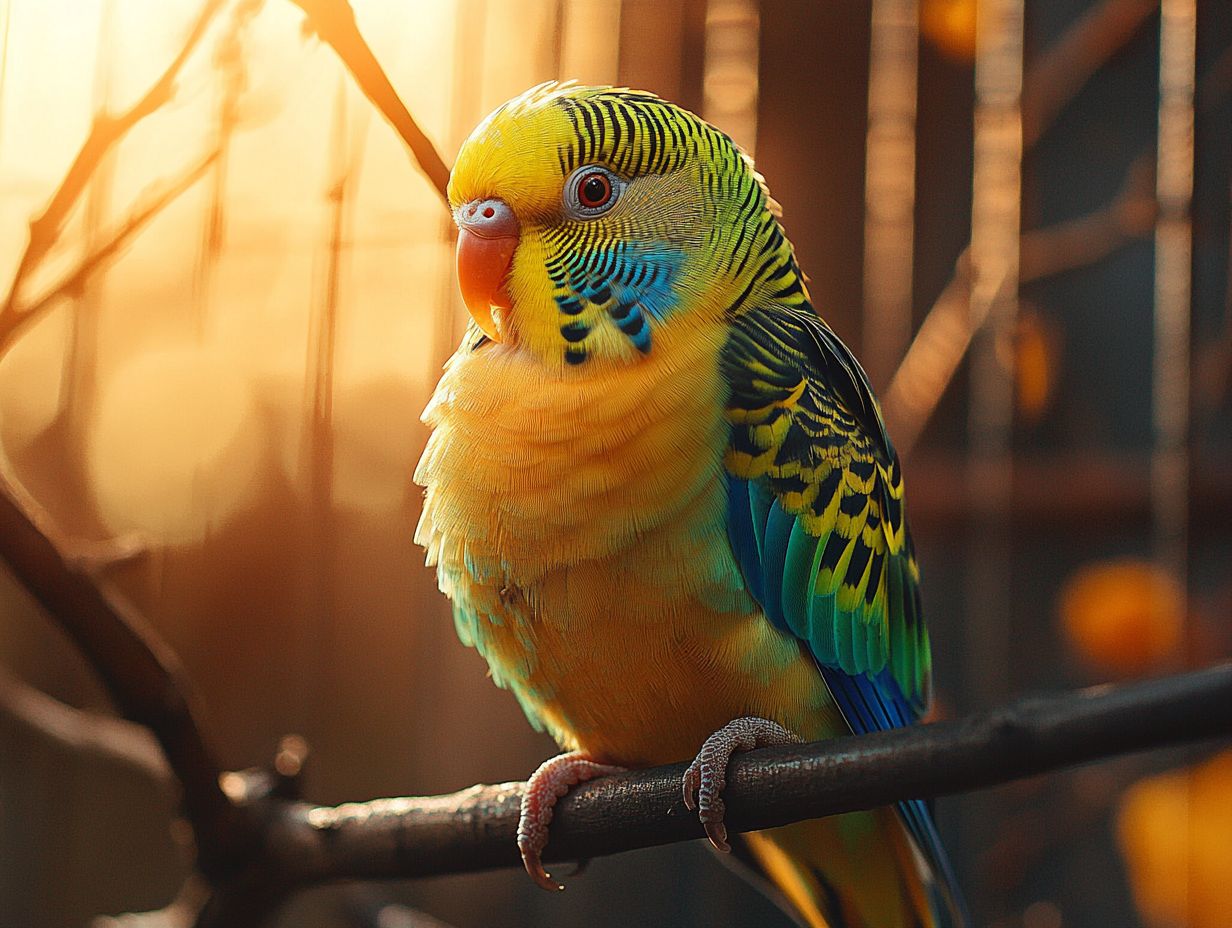
- Stay alert for common allergens! Dust, feather dust, feathers, and certain foods can affect your bird s health.
- If your bird shows signs of allergies, such as sneezing, watery eyes, or itchy skin, consult a veterinarian for proper diagnosis and treatment.
- Taking preventive measures, such as regularly cleaning and dusting the bird’s habitat, can help promote a healthy and happy life.
Understanding Allergies in Pet Birds
Understanding allergies in pet birds, including African Greys, cockatoos, cockatiels, and parakeets, is essential for ensuring their health and happiness. Allergies in these cherished companions often arise from feather dust, pet dander, and various environmental factors.
These factors can potentially lead to respiratory issues that drastically affect their quality of life. As an owner, it s important to recognize the signs of allergies and their impact on your bird’s immune system.
What Causes Allergies in Birds?
Allergies in birds can stem from various environmental factors, with feather dust and pet dander being the main causes. These allergens can trigger reactions that jeopardize their respiratory health.
Besides feather dust and pet dander, be aware of other indoor pollutants like mold spores and cigarette smoke. These can further exacerbate respiratory issues in your avian companions.
When exposed to these irritants, birds can develop chronic conditions such as asthma or other respiratory infections. Their delicate breathing passages react intensely to allergens, leading to inflammation and difficulty breathing.
Over time, these ongoing irritations can impair respiratory function and negatively impact the immune system. This makes your feathered friends more vulnerable to infections and a host of other health concerns.
Signs and Symptoms of Allergies in Pet Birds
Recognizing the signs and symptoms of allergies in pet birds is crucial for ensuring quick action and care. Understanding common pet bird allergies can help identify indicators such as sneezing, watery eyes, runny noses, and skin rashes.
These symptoms can signify allergic reactions that, if left unchecked, may develop into more serious respiratory issues. By being attentive to these signs, you can enhance your feathered friend s comfort and overall health.
Physical and Behavioral Changes to Watch For
Physical and behavioral changes in your pet birds often serve as crucial indicators of allergic reactions. To ensure their well-being, it’s important to follow preventative care tips for your pet bird. Symptoms like sneezing, a runny nose, and skin rashes can indicate underlying respiratory issues.
You might notice these physical signs alongside shifts in behavior. Perhaps your bird becomes more aggressive, withdraws from social interactions, or suddenly alters its vocalization patterns.
If your pet seems less active or shows signs of distress, such as excessive preening or feather plucking, it indicates that their discomfort may extend beyond physical symptoms.
Paying close attention to these behavioral changes is vital, as they can reveal the severity of the allergic reaction and signal an urgent need for veterinary assessment to prevent potential complications.
Common Allergens for Pet Birds
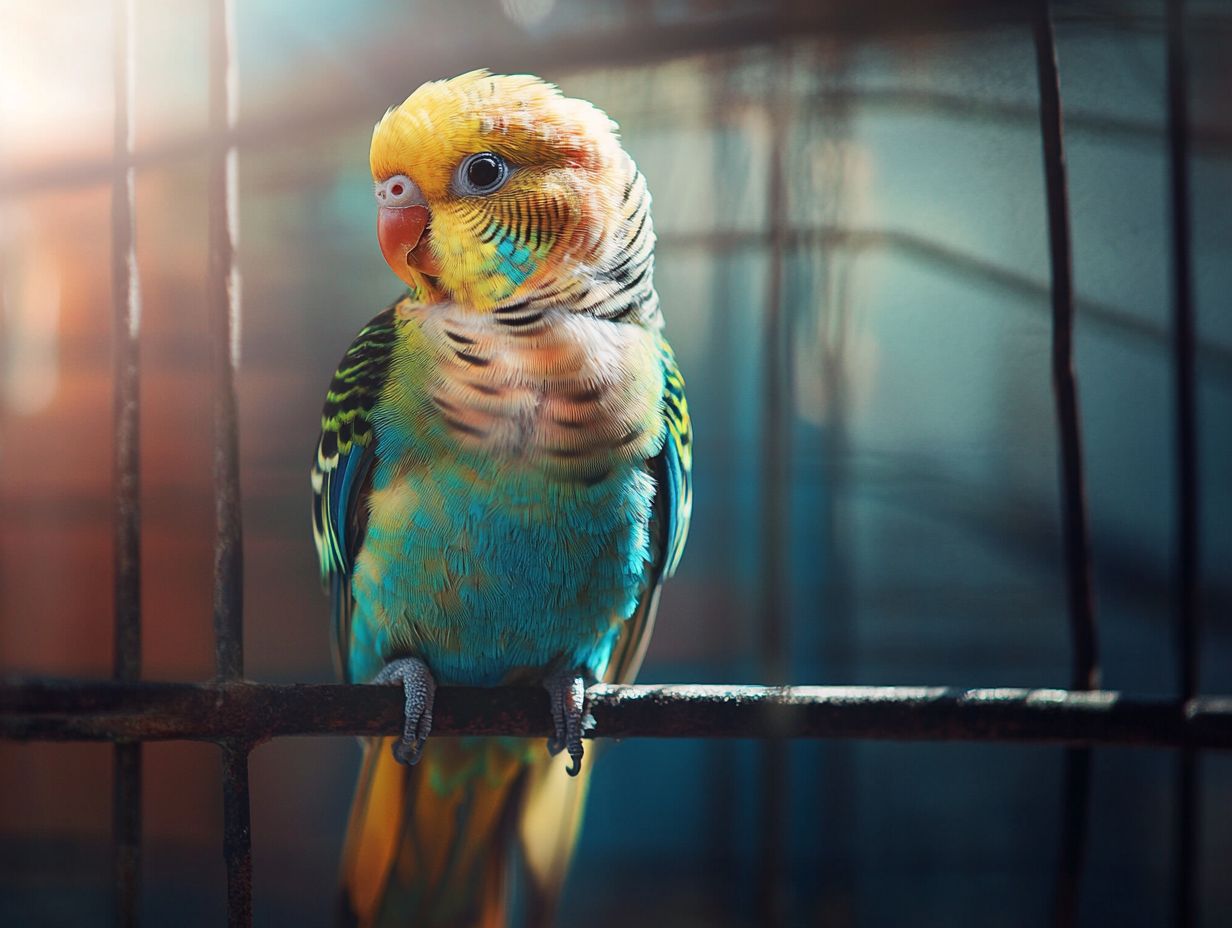
Identifying common allergens for your pet birds is essential for preventing allergic reactions and promoting their overall well-being. Common allergens include feather dust, pet dander, and even the cleaning products you use around their cages.
Bird droppings can also play a significant role in respiratory issues for parrots. By being mindful of these potential triggers, you can create a healthier environment for your pet birds.
Identifying and Eliminating Potential Triggers
To manage allergies effectively in your pet birds, it’s crucial to identify and eliminate potential triggers like feather dust, pet dander, and allergens from cleaning cages. For a deeper understanding, you should also consider understanding bird food allergies. This requires you to closely observe your bird’s environment to pinpoint specific allergens that may be causing irritation.
Regularly checking for mold in food and water dishes is essential. Ensure that bedding materials are hypoallergenic. Using air purifiers can significantly reduce airborne particles, fostering a healthier environment for your birds.
Implementing a strict cleaning routine where the cage and surrounding areas are cleaned with bird-safe products can dramatically minimize dust accumulation. Consulting with an avian vet can provide tailored advice that considers the unique needs of your pet birds, ensuring their comfort and well-being.
Diagnosing Allergies in Pet Birds
Diagnosing allergies in pet birds requires a careful approach to identify the specific allergens at play, often necessitating the expertise of an allergist. Additionally, it’s crucial to be aware of recognizing signs of pain in your pet bird during this process.
Utilizing diagnostic methods such as skin prick tests and blood tests can effectively pinpoint the precise sources of your parrot’s allergies. This targeted information enables you to develop customized treatment and management strategies, ensuring the well-being of your pet birds.
Tests and Examinations for Accurate Diagnosis
Tests and examinations, such as allergy tests conducted by an allergist, are vital for accurately diagnosing allergies in pet birds. Typically, these tests include skin prick tests and blood tests designed to identify specific allergens.
Understanding these procedures is essential for you as a bird owner, especially if you’re looking to enhance your pet birds’ well-being. Skin prick tests involve applying small amounts of potential allergens to your bird s skin and observing for any reactions, which helps pinpoint specific sensitivities.
Blood tests measure the levels of IgE antibodies, a type of antibody that shows how your bird reacts to allergens. By interpreting the results of these tests, you can gain clarity on what triggers allergic reactions in your parrot, allowing you to make informed decisions about their environment, diet, and overall care.
Treating and Managing Allergies in Pet Birds
Treating and managing allergies in pet birds necessitates a thorough approach. This may involve administering allergy medications like antihistamines and allergen immunotherapy, alongside implementing lifestyle changes to enhance air quality and reduce exposure to allergens.
Taking these simple steps can drastically improve your birds quality of life!
Medications and Lifestyle Changes for Relief
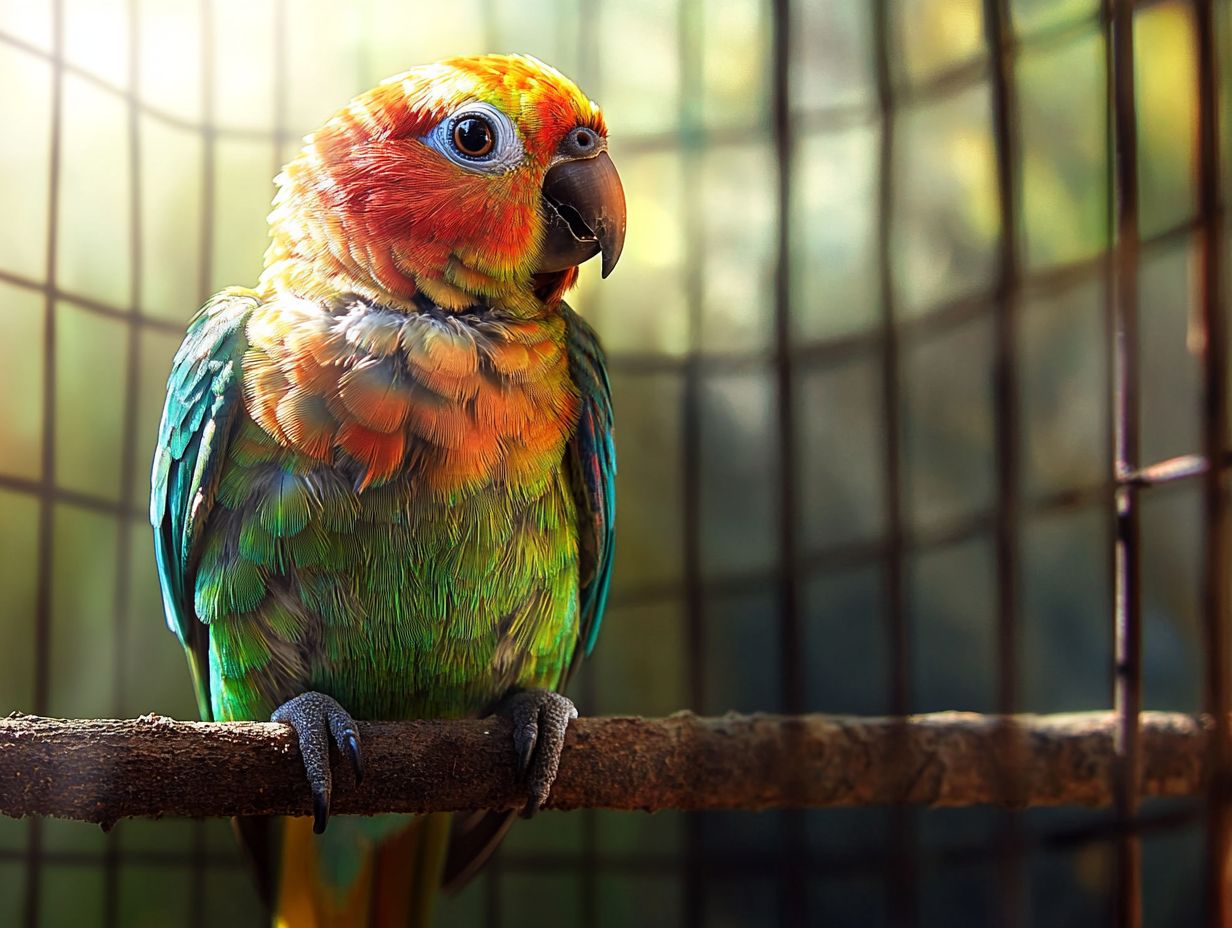
Medications like antihistamines can be effective for providing relief from allergic reactions in your pet birds, especially when paired with lifestyle changes aimed at reducing respiratory issues.
Consider introducing air purifiers into your living spaces to filter out natural dust and allergens, creating a cleaner and safer environment for your pet birds. Regular bathing is another excellent practice to keep their feathers clean and promote healthy skin.
It s crucial to avoid exposing them to smoke, strong odors, and harsh cleaning products. Opting for hypoallergenic bedding and toys can further minimize potential triggers.
By integrating quality medical care with these proactive measures within your home, you can significantly enhance your birds’ quality of life and help them thrive.
Start implementing these changes today for a happier, healthier bird!
Preventing Allergies in Pet Birds
Preventing allergies is essential for every bird owner. Simple steps can create a healthier home for your birds.
Implementing preventive measures keeps your bird healthy and happy. Focus on enhancing air quality through effective cleaning methods.
A balanced diet rich in essential nutrients is vital for your pet’s wellness. Regular veterinary check-ups can help catch health issues early.
Introduce a variety of toys and activities for mental stimulation. Watch for changes in behavior or appetite, as these can signal health concerns.
Ensure your cage is the proper size and placed correctly. Safe social interactions also enhance your bird’s quality of life.
Frequently Asked Questions
-
What are some common signs of allergies in pet birds?
Signs include excessive scratching, sneezing, runny nose or eyes, and skin irritation.
-
Can my pet bird develop allergies over time?
Yes, birds can develop allergies to certain foods, environmental factors, or grooming products.
-
What should I do if I suspect my pet bird has allergies?
Take them to a veterinarian for a proper diagnosis and treatment options.
-
Are there any specific foods that can trigger allergies in pet birds?
Common triggers include peanuts, corn, and wheat. Watch out for food additives too.
-
Can allergies in pet birds be treated?
Yes, treatments may include medication, dietary changes, or environmental modifications.
-
Is it possible for my pet bird to have allergies to their own feathers?
Yes, this condition, known as feather dust or dander allergies, can be managed with regular grooming.
Ensure your bird’s health today!

